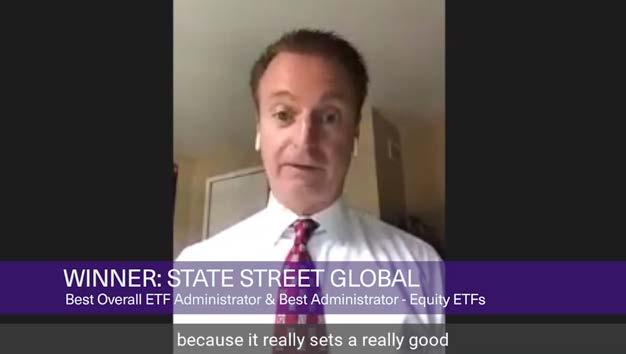
7 minute read
TAKING A LONG-TERM VIEW PAYS DIVIDENDS
State Street: Best Overall ETF Administrator & Best ETF Administrator – Equity ETFs By Philippa Aylmer
It’s been an outstanding year for State Street, according to Frank Koudelka, Senior Vice President and Global ETF Product Specialist at State Street Global Services. Despite the pandemic and the move to working from home, the firm has seen an increase in volumes, as well as some significant ETF fund launches.
From December 2019 to August 2020, global ETF servicing increased from USD3.893 trillion to USD4.134 trillion while US ETF servicing increased from USD3.054 trillion to USD3.243 trillion. State Street now covers around 70 per cent of the US ETF market and 60 per cent of the global market.
It should come as no surprise that State Street was the winner of two awards in the ETF Express US 2020 Awards: Best Overall ETF Administrator and Best ETF Administrator – Equity ETFs.
In terms of their equity offering, State Street has a strong track record servicing passive products and existing transparent active ETFs. However, Koudelka believes that where the firm now also differentiates itself is in the semi-transparent active ETF space. The SEC started granting preliminary approval for non-transparent active ETFs in December 2019.
“We were the first service provider to launch the Precidian Active Share structure, the Fidelity Tracking Basket structure, the NYSE Proxy Basket structure and the T Rowe Price Proxy Basket structure.”
From a processing and back office standpoint, semi-transparent active ETFs have some different requirements. Not only that, the various models also differ from each other, explains Koudelka.
For example, State Street launched a semi-transparent active ETF with American
Century utilising the Precidian ActiveShares model. “We introduced a new entity to the ecosystem: the Authorised Participant Representative (APR),” he says.
The APR, which is effectively an agency broker dealer – called State Street Global Markets – sits between the funds and the marketplace and trades the basket on their behalf. It allows for asset managers to maintain confidentiality over their intellectual property or their holdings. “We were the first to launch an APR and we had to set up all the processes to make sure that the baskets were only published to these APRs.”
Koudelka admits that rolling out that ETF during the pandemic was challenging, but he emphasises that “we were able to do so successfully on 31 March 2020, right in the midst of the pandemic because there had been an extensive model office period where we were testing the concepts. As this client was first to market, we wanted to make sure we got it right.”
Since then, the products have been very successful and continue to trade with tight spreads and Koudelka has seen good client adoption. “That has meant a lot to our business.”
The other semi-transparent active ETF launches – the Fidelity Tracking Basket, the
T Rowe Price Proxy Basket and the NYSE
Proxy Basket – differ in that they publish a basket to the broader market. This meant that State Street had to leverage its Performance & Analytics team to build a new set of capabilities and reporting to measure the performance of the proxy to the fund. Essentially, these types of structures publish a proxy of the fund rather than a pro rata slice of the fund holdings, and by doing this, it is possible to
protect the intellectual property while providing enough data for market makers to price and hedge, states Koudelka.
The team has worked for 10 years with regulators, intellectual property firms, exchanges, clients, market makers and authorised participants to help get these structures approved by the regulators. In fact, the firm has a rolling three-year product and technology road map and invests annually between USD3.5 to 5 million dollars in their ETF platform.
Another potentially far-reaching change in the ETF industry has been the SEC’s introduction of the ETF Rule – or 6c-11 – which simplifies the ability of asset managers to launch ETFs in the US.
The ETF Rule was announced in late 2019 but will not be fully effective until December 2020. The rule allows for more participants to come to market and more quickly. This is because it eliminates the exemptive relief process that ETFs are required to go through as well as making it less expensive. All ETFs are now treated the same from a holdings disclosure standpoint.
“The ETF rule has had some really significant impacts not just for State Street as an organisation but to our clients and broader ETF market as well,” says Koudelka.
In response to this, State Street has built out its service offering. “It has been a yearlong effort. As soon as the rule was published, we decided to look at data that we already had that we could repurpose for Rule 6c-11. What we needed to build and what we needed to strengthen as part of the rule. We put out a number of workstreams to do just that. Our intention is to have this fully rolled out by the November timeframe.”
State Street has also strengthened its capabilities around the use of custom and multiple baskets – the ETF rule permits ETF issuers to use custom baskets – with some of these integrated to the Bloomberg BSKT service. “Now any client that leverages the ETF rule can leverage and utilise State Street for a more efficient custom basket process,” he says.
Looking ahead to 2021, Koudelka highlights the need for education and advice on best practice. As well as a dedicated team to assist with the launch of an ETF, State Street has published a raft of reports and thought leadership papers covering trends across global ETF markets.

He sees more active managers coming into the space citing conversations and education sessions with no less than 25 traditional mutual fund asset managers looking to launch. “I wouldn’t say that they will all launch a semi-transparent but almost all will do an active ETF launch,” he says adding that he would not be surprised to see a wave of existing issuers come out leveraging the semi-transparent active ETFs models alongside their current fully transparent active and passive products.
There is no doubt State Street is in it for the long-term: it has been in the ETF market since 1993. “But at the end of the day, through a volatile market, we are able to help our clients get all of these products to market and they have done very well. Whether it is servicing our clients, guiding them on industry best practice or investing in technology, we believe our clients recognise that,” he adds. n
Frank Koudelka Senior Vice President and Global ETF Product Specialist, State Street
Frank Koudelka is the Senior Vice President and Global ETF Product Specialist for State Street. State Street is a market leader servicing over 62 per cent of global ETF assets. In this role, Frank establishes the strategic direction for ETF servicing, assists with the on-boarding of new clients and drives the product and technology strategy as it relates to ETFs. Previous to this role Frank led the Institutional Transfer Agency business unit. Frank has been with State Street for over 18 years, joining the firm as a part of the IBT acquisition. He has 34 years of experience in the financial services industry. While at Investors Bank and Trust, Frank was responsible for the Transfer Agent teams in Europe and the US. Additionally, Frank ran the Institutional Custody / Wealth Management group; providing back office services to banks, endowments, foundations and registered investment advisors.
Prior to joining Investors Bank and Trust, Frank held diverse roles at PaineWebber, the National Securities Clearing Corporation, First Data and PFPC. This included operations management, product development and marketing. He attended St. John’s University in New York reaching a Bachelor of Science degree in Finance and served in the United States Marine Corps Reserves.
Sometimes there is more to the picture. Sometimes there is another picture entirely.

In an ever-evolving and increasingly complex market environment, discipline matters more now than ever before. At AGFiQ, our unartificial intelligence delivers stability for your investments, whatever tomorrow may bring.
AGF.com
™The ‘AGFiQ’ logo is a trademark of AGF Management Limited and used under license. Investment advice should be tailored to the specific needs of an investor. We strongly recommend you consult with a financial advisor prior to making investment decisions. The information is general and not to be considered as an offer or solicitation to buy or sell securities. AGFiQ is a collaboration of investment professional from AGF Investments Inc. (a Canadian registered portfolio manager) and AGF Investments LLC (a U.S. registered adviser).







